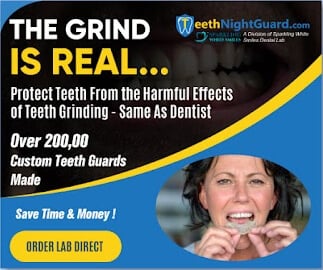If you’re following sleep science news and updates or looking at sleep improvement tips on TikTok, you may have heard about mouth taping. It’s become increasingly popular over the last few years as a method for improving sleep, especially sleep that is disrupted by snoring. So, you might be wondering if you’re a good candidate to try this method.
In this article, we will dig into some of the details, research, and precautions to help you decide. Let’s start with the basics:
What is mouth taping?
Mouth taping is exactly what it sounds like: a practice of taping your mouth shut while you sleep. The main goal of mouth taping is to prevent mouth breathing. That’s because breathing through your nose is significantly better for you than breathing through your mouth.
Your body is designed to breathe through your nose, and doing supports your overall health. First of all, breathing through your nose increases your body’s oxygen absorption because it triggers your system to produce nitric oxide, which also helps your body fight free radicals. Additionally, your nose hairs function as filters for the air coming into your body. So, breathing through your nose provides better filtration, keeping a lot of dust and dirt from entering your lungs.
Your nose also heats and humidifies the air as it enters your body, which better prepares it for the lungs and can be crucial in cold or dry environments. And nose breathing regulates the speed of your breath better than mouth breathing does, which means that it can help to relieve stress.
Meanwhile, mouth breathing does not provide filtration or nitric oxide, and it causes dry mouth, eliminating the saliva that your mouth needs preserve a healthy pH for fighting bacteria.
Sleeping with your mouth open can also affect your airway because it can influence the placement of your jaw and your soft palette. In fact, mouth breathing is one of the leading causes of snoring. So, you can see why some people might turn to mouth-taping.
Mouth taping reduces snoring, but it’s important to take precautions.
Breathing through your nose can reduce snoring, and it might even lessen other bad sleep habits like teeth grinding. This is because snoring can interrupt your oxygen levels during sleep, which will interrupt your sleep cycles. Restlessness and interrupted sleep will increase your physical stress level and keep you from staying in deep sleep.
Teeth grinding happens more during the early stages of sleep than it does during deep sleep. So, interrupted sleep cycles can increase the frequency of grinding. In short, by addressing a snoring habit, you may actually be improving multiple aspects of your sleep.
However, you should not proceed without caution. Oftentimes, your body turns to mouth breathing because it is having difficulty maintaining enough airflow through your nose. This might arise from a number of issues, including a deviated septum, a cold, allergies, or the structure of your airway.
If you have any of these issues, mouth taping is definitely not for you. You don’t want to cut off your body’s backup source of air.
Additionally, mouth taping is not good for people with sleep apnea. Sleep apnea is a version of snoring that is extreme enough to have serious health consequences. It involves a significant reduction in or occasional cessation of airflow (meaning you are depriving your body of oxygen). Mouth taping will not fix this issue and may even make it worse depending on what is causing the sleep apnea.
So, if you snore, you will want to talk to your doctor about whether you might have sleep apnea and what treatments you should try if you do.
Options other than mouth taping.
Mouth taping is not the only way to promote breathing through your nose during sleep. Some people find that wearing a night guard (usually to protect teeth from the effects of grinding or clenching) helps them avoid mouth breathing at night.
Others have found the most relief from using mandibular advancement devices (MADs), which can be used to treat obstructive sleep apnea. These devices, worn in the mouth over the teeth, keep the jaw from falling backward and blocking the airway during sleep. You can find ones that you shape at home by boiling and biting into them, or you can get semi-custom models through the mail or a custom model with a prescription from your dentist.
You can also reduce snoring by sleeping on your side instead of your back, raising the head of your bed, using nasal strips or a nasal dilator, treating a deviated septum or chronic allergies, and avoiding alcohol and cigarettes.
If your difficulty sleeping arises from snoring, you should see which of these options works best for you. If you continue to experience fatigue, interrupted sleep, teeth grinding, insomnia, or other sleep disorders, you should speak with a health professional about further treatment options.
To protect your teeth from the effects of grinding, consider getting a custom night guard from TeethNightGuard.

JOIN OUR NEWSLETTER! RECEIVE PROMOTIONS & COUPONS FOR CUSTOM DENTAL NIGHT GUARDS
INTERESTED IN BECOMING AN AFFILIATE OF TeethNightGuard.com?
Earn a 15% commission for simply sharing with your friends and family through email or social media such as Facebook, Reddit, or Twitter. Sign up and learn more here: https://www.teethnightguard.com/pages/register-affiliate-account
ULTRA THIN HARD ACRYLIC SINGLE 1MM SLIM FIT CUSTOM BITE GUARD

$139.99
Item Number THINACR Manufacturer Sparkling White Smiles Dental Lab Rating Product Description 1mm Ultra Thin Professionally made Custom Night Guard Our Custom Teeth Night Guards are BPA, Latex and Phthalate Free Night Guard designed for severe teeth grinding/bruxism. This Night Guard is made of… Read More